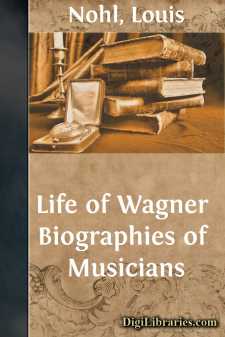Categories
- Antiques & Collectibles 13
- Architecture 36
- Art 48
- Bibles 22
- Biography & Autobiography 813
- Body, Mind & Spirit 142
- Business & Economics 28
- Children's Books 17
- Children's Fiction 14
- Computers 4
- Cooking 94
- Crafts & Hobbies 4
- Drama 346
- Education 46
- Family & Relationships 57
- Fiction 11829
- Games 19
- Gardening 17
- Health & Fitness 34
- History 1377
- House & Home 1
- Humor 147
- Juvenile Fiction 1873
- Juvenile Nonfiction 202
- Language Arts & Disciplines 88
- Law 16
- Literary Collections 686
- Literary Criticism 179
- Mathematics 13
- Medical 41
- Music 40
- Nature 179
- Non-Classifiable 1768
- Performing Arts 7
- Periodicals 1453
- Philosophy 64
- Photography 2
- Poetry 896
- Political Science 203
- Psychology 42
- Reference 154
- Religion 513
- Science 126
- Self-Help 84
- Social Science 81
- Sports & Recreation 34
- Study Aids 3
- Technology & Engineering 59
- Transportation 23
- Travel 463
- True Crime 29
Life of Wagner Biographies of Musicians
by: Louis Nohl
Description:
Excerpt
CHAPTER I.
1813-1831.
His Birth—The Father’s Death—His Mother Remarries—Removal to Dresden—Theatre and Music—At School—Translation of Homer—Through Poetry to Music—Returning to Leipzig—Beethoven’s Symphonies—Resolution to be a Musician—Conceals this Resolution—Composes Music and Poetry—His Family Distrusts his Talent—“Romantic” Influences—Studies of Thoroughbass—Overture in B major—Theodor Weinlig—Full Understanding of Mozart—Beethoven’s Influence—The Genius of German Art—Preparatory Studies ended.
“I resolved to be a musician.”—Wagner.
Richard Wilhelm Wagner was born in Leipzig, May 22, 1813. His father at that time was superintendent of police—a post which, owing to the constant movement of troops during the French war, was one of special importance. He soon fell a victim to an epidemic which broke out among the troops passing through. The mother, a woman of a very refined and spiritual nature, then married the highly gifted actor, Ludwig Geyer, who had been an intimate friend of the family, and removed with him to Dresden, where he held a position at the court theatre and was highly esteemed. There Wagner spent his childhood and early youth. Besides the great patriotic uprising of the German people, artistic impressions were the first to stir his soul. His father had taken an active interest in the amateur theatricals of the Leipzig of his day, and now the family virtually identified themselves with the practical side of the art. His brother Albert and sister Rosalie subsequently joined the theatre, and two other sisters diligently devoted themselves to the piano. Richard himself satisfied his childish tendency by playing comedy in his own room and his piano-playing was confined to the repetition of melodies which he had heard. His step-father, during the sickness which also overtook him, heard Richard play two melodies, the “Ueb’ immer Treu und Redlichkeit” and the “Jungfernkranz” from “Der Freischuetz,” which was just becoming known at that time. The boy heard him say to his mother in an undertone: “Can it be that he has a talent for music?” He had destined him to be an artist, being himself as good a portrait painter as he was actor. He died, however, before the boy had reached his seventh year, bequeathing to him only the information imparted to his mother, that he “would have made something out of him.” Wagner in the first sketch of his life, (1842) relates that for a long time he dwelt upon this utterance of his step-father; and that it impelled him to aspire to greatness.
His inclinations however did not at first turn to music. He was rather disposed to study and was sent to the celebrated Kreuzschule. Music was only cultivated indifferently. A private teacher was engaged to give him piano lessons, but, as in drawing, he was averse to the technicalities of the art, and preferred to play by ear, and in this way mastered the overture to “Der Freischuetz.” His teacher upon hearing this expressed the opinion that nothing would become of him. It is true, he could not in this way acquire fingering and scales, but he gained a peculiar intonation arising from his own deep feeling, that has been rarely possessed by any other artist. He was very partial to the overture to “The Magic Flute,” but “Don Juan” made no impression on him.
All this, however, was only of secondary importance. The study of Greek, Latin, mythology, and ancient history so completely captivated the active mind of the boy, that his teacher advised him seriously to devote himself to philological studies. As he had played music by imitation so he now tried to imitate poetry. A poem, dedicated to a dead schoolmate, even won a prize, although considerable fustian had to be eliminated. His richness of imagination and feeling displayed itself in early youth. In his eleventh year he would be a poet! A Saxon poet, Apel, imitated the Greek tragedies, why should he not do the same?...


